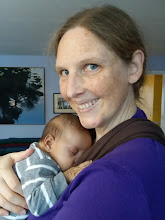Keeping the chaos at bay
They say that wood warms you twice, once when you cut it and once when you burn it. I think “they” in this case must be people who’ve never really heated with wood, because those of us who’ve grown up with it know that wood warms you seven or eight times: when you cut the trees, when you saw it to length, when you split it, when you stack it, when you carry it into the house and brush the damp splinters off the arms of your jacket and sweep the floor. This weekend I spent three hours stacking wood at a friend’s house as the sun rose and stained the half-frozen lake, and I still wasn’t warm. But it was something to be done, something useful and lasting, and I could, for a time, feel worthwhile and alive.
And here I take another step into the murky waters of confessional blogging, which is something I swore I’d never do. Hell, here goes. Matt is leaving me.
It feels like I’ve barely seen him since I got back to
I said we could still be friends but not for a while, and certainly not sharing a house. Not after. I asked if he could be out by the end of the month and he said probably. So that’s it. Two years, almost to the day. Actually I think it was our anniversary, though neither of us was really good about keeping track. (That pronoun again, us. It’s going to be difficult to stop using.) As he spoke I had a sense of things crumbling, shattering, hurtling into the long dark. I thought about how life, in the biologist’s sense of the noun, is an island of order in a sea of chaos. From the little light that reaches us from our star, enough is captured, bound as energy in matter, that the thin scrim of the planet’s surface teems with life. How is it possible? The entropy of the universe is always increasing: things tend to a state of maximum disorder. Eventually the clock winds down, the stars burn out. The very hum of molecular motion, the last heat in the universe, eventually will come to a stop. But life thumbs its nose at entropy. Life manages, by capturing a fraction of the energy that passes through, to build a pattern out of disorder. It’s temporary, of course. When a single life ends, entropy takes over fast, returning the molecules of life to their constituent, arbitrary parts. When all life ends, it’ll be much the same. Whether the thin green shawl of this planet is sheared off in a gust of solar wind as the sun explodes, or whether we hasten the process along with nuclear winter, eventually it’s going to end. Ashes to ashes, dust to dust, carbon to carbon. We are fortunate to be alive, to be these particular configurations of molecules that we are, but it’s going to end. That’s a given, by the very laws of Nature. I always used to laugh at those scenes in horror movies when somebody screams, “we’re all going to die!” Yeah, no shit, Sherlock.
Well, I had tried to build an island of order with Matt. And it didn’t work. And it’s fortunate, I suppose, that things ended now when we’re still civil, when all the assets we have to divide are a mattress and a couple bookshelves. And I have my health, my freedom, my small savings. And I can tell myself these things forty times a day without effect. I close my eyes and all I see is stars traveling outward in the vast dark.

